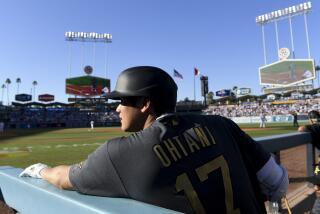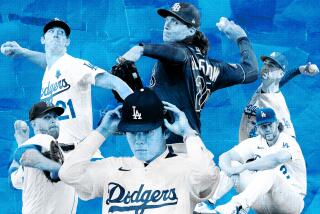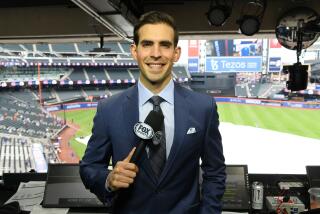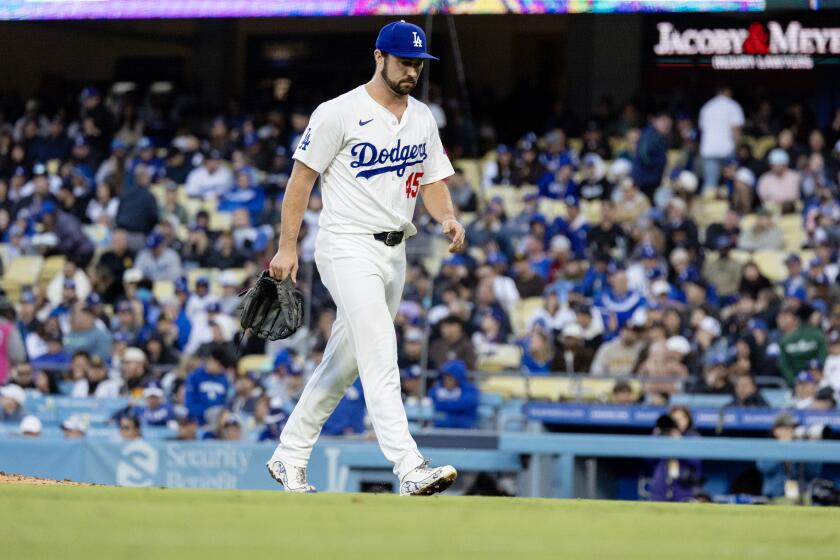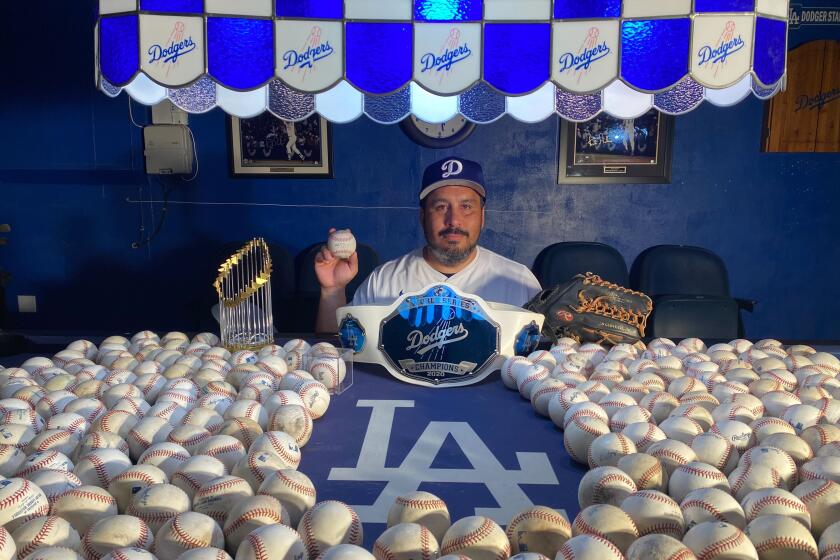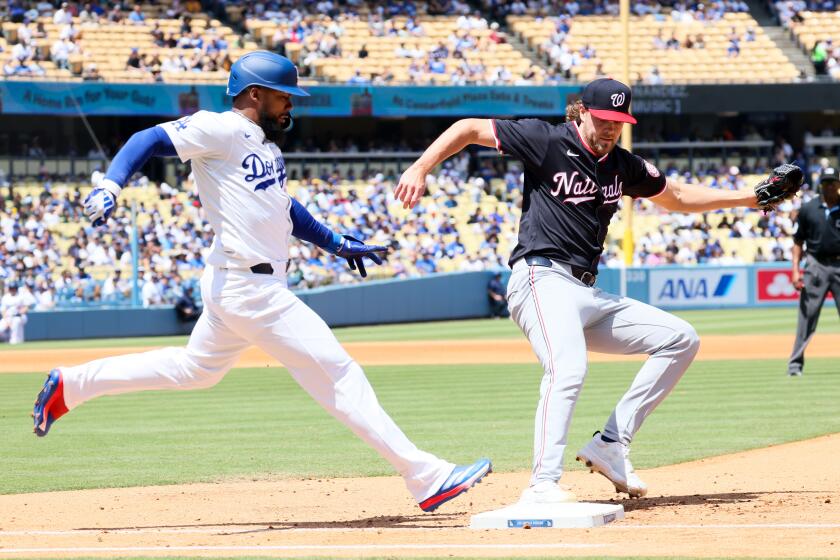Dodgers in Australia: Just a step in MLB’s plan for world domination
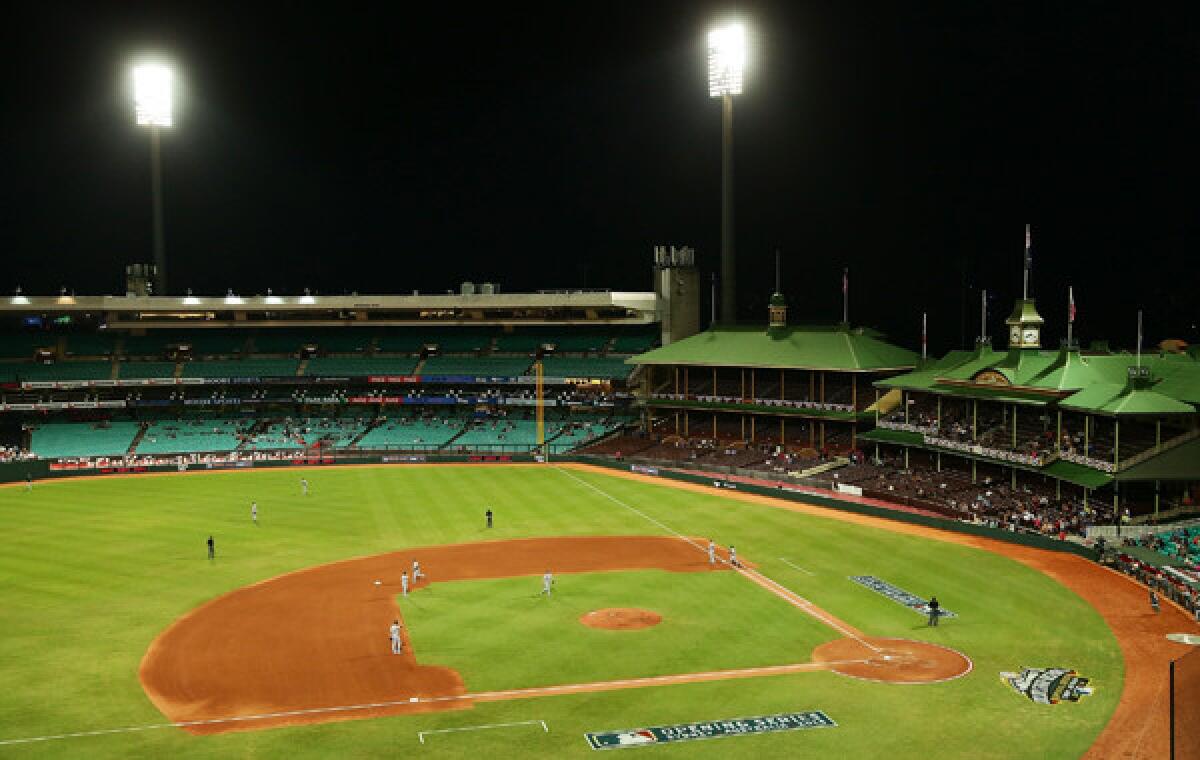
SYDNEY, Australia — On the morning the Dodgers landed in Australia, there was a vague reference to their upcoming season-opening series on the cover of the Sydney Morning Herald.
There was a small box that included a picture of basketball star LeBron James and the words, “Are the NBA and NFL coming to Sydney?” directing readers to a hopeful back-page article.
The gist of the story: That large crowds at the upcoming two-game baseball series between the Dodgers and Diamondbacks might one day lead to Australia hosting NBA and NFL regular-season games.
The implication was clear: Australians care about basketball and football, but not baseball.
Australia ranks No. 1 outside the U.S. in NBA League Pass subscriptions, but the country’s interest in baseball is minimal. When the Dodgers faced an Australian all-star team Thursday in an exhibition, the 40,000-seat Sydney Cricket Ground was largely empty.
About as much as known here about Clayton Kershaw as is known in the United States about cricket star Mitchell Johnson.
The Dodgers’ nearly sold-out regular-season games against the Arizona Diamondbacks on Saturday and Sunday — Saturday at 1 a.m. and 7 p.m. PDT — won’t suddenly change that. Major League Baseball knows that, said Paul Archey, the league’s vice president of international business operations.
“We’re not going to know the benefits of this game on Sunday night,” Archey said. “It’s long term. It can be generational.”
MLB was paid by a promoter to open its season in Sydney, but Archey said that wasn’t the league’s motive for coming. “This is not about money,” he said. “This is about the future. It’s about developing the market for bigger business and it’s about developing the market for more players.”
MLB has opened regular seasons in Mexico, Japan and Puerto Rico. What makes Australia different is that baseball doesn’t have a large fan base.
The Dodgers were also involved in MLB’s last venture into a nontraditional market. That was in 2008, when the Dodgers and the San Diego Padres played a two-game exhibition series in China.
Archey views that trip as a success. MLB now has 11 television partners in China, where it funds three youth academies and a 60-school intercollegiate league.
“None of this existed prior to that game,” Archey said.
The intercollegiate program illustrates MLB’s long-view approach to expanding the game’s reach. MLB doesn’t expect to find future All-Stars there right away, but Archey said, “Those are young people who are going to go into the workforce. They’re going to know the game. They’ll have kids, introduce the game to them. They’re going to become teachers, maybe become physical education teachers. Now, they can introduce baseball.”
Whereas MLB started from scratch in China, it already had a foundation in Australia.
Baseball here is believed to date to the mid-19th century, brought by American miners during the Victorian gold rush. Baseball is a niche sport, but enough of it is played that the country has produced 28 Australian-born major leaguers, many of whom are still playing. The most notable is All-Star closer Grant Balfour of the Tampa Bay Rays.
Ian Chappell, a cricketer who was captain of Australia’s national team in the early 1970s, was also a baseball player. Chappell grew fond of baseball in the 1950s listening to New York Yankees games on American naval radio broadcasts. He was on Australia’s national baseball team from 1964-1966 and said he might have pursued a career in baseball had an avenue to do so existed.
“It would have been a tough decision,” said Chappell, who will call the Australian national broadcast of the series between the Dodgers and Diamondbacks.
Chappell’s younger brother Greg offered a similar sentiment. A former shortstop in baseball, Greg became the greatest Australian batsman of his generation as a cricketer.
Baseball continues to lose Australia’s top athletes to other sports, particularly Australian-rules football, rugby and cricket. But in a country where only a handful of athletes earn more than $1 million annually, Archey is hopeful that baseball’s salaries can entice top talent. To convey Kershaw’s stature to a largely novice audience, Australian newspapers have written at length about the left-hander’s new seven-year, $215-million contract.
“When you see the salaries, it helps,” Archey said.
Since Australia’s defunct baseball league relaunched in 2010 with MLB’s backing — MLB owns a 75% stake in the league — youth participation in baseball has increased 33%, according to Archey.
However, the Dodgers don’t view themselves as baseball missionaries. Provided they do what they’re supposed to do, they say the sport should sell itself.
Said catcher A.J. Ellis: “If we play good, clean baseball and show these guys how great this game is, these fans here will gravitate toward it.”
Twitter: @dylanohernandez
More to Read
Are you a true-blue fan?
Get our Dodgers Dugout newsletter for insights, news and much more.
You may occasionally receive promotional content from the Los Angeles Times.
